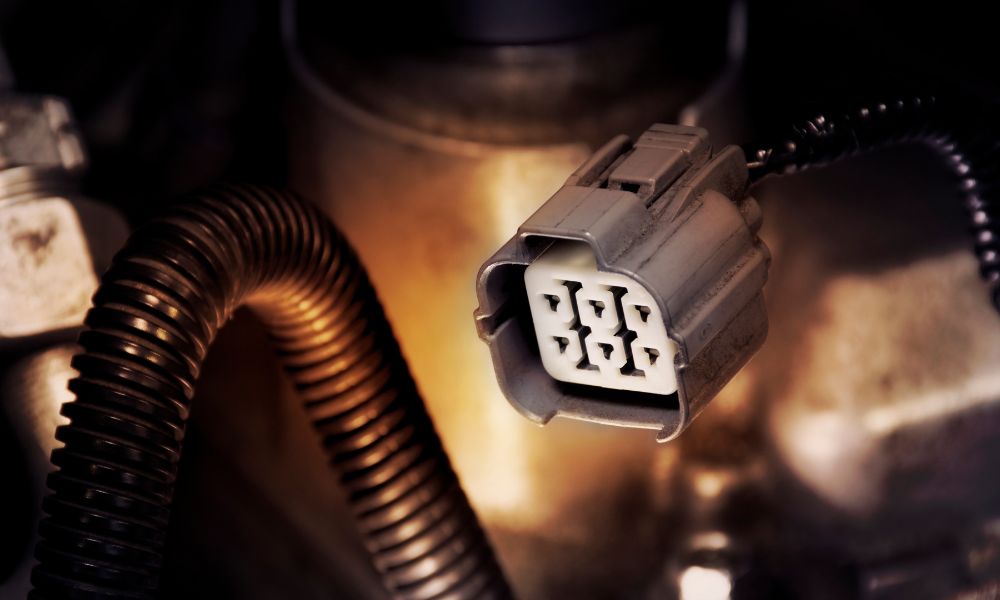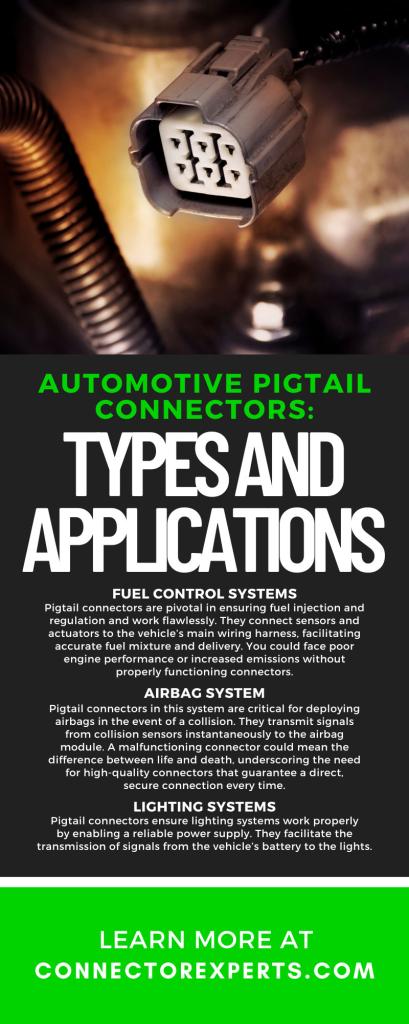Automotive Pigtail Connectors: Types and Applications
Automotive Pigtail Connectors: Types and Applications

Automotive pigtail connectors are essential components in automotive and industrial applications. These connectors provide a secure and reliable connection for electrical wiring, ensuring efficient signals and power transmission between different parts of a vehicle or machinery. Learn more about the types and applications of automotive pigtail connectors.
What Are Pigtail Connectors?
A pigtail connector, also known as a pin connector, is a type of electrical connector that consists of a male or female end and multiple wires joined together. These connectors can come in different shapes, sizes, and terminal numbers, making them versatile for various automotive applications. For instance, a sedan may use a two-pin connector for exterior lights, while an RV could require a seven-pin connector for light systems.
6 Automotive Systems Reliant on Connectors
Many areas of your vehicle rely on connectors to operate, and understanding the intricacies of these components can help you troubleshoot issues and maintain your vehicle more effectively. Some of the automotive systems relying on connectors include:
- Fuel control systems
- Airbag systems
- Lighting systems
- Heating and cooling systems
- Battery systems
- Advanced driver assistance systems
Whether you’re a professional needing your vehicle for daily commutes or an enthusiast keen on automotive tech, knowing about these connectors helps keep your car in top shape.
Fuel Control Systems
The fuel control system is at the heart of your vehicle’s efficiency and performance, a complex network that demands precision and reliability. Pigtail connectors are pivotal in ensuring fuel injection and regulation and work flawlessly. They connect sensors and actuators to the vehicle’s main wiring harness, facilitating accurate fuel mixture and delivery. You could face poor engine performance or increased emissions without properly functioning connectors.
Airbag System
Safety is non-negotiable, and the airbag system is at the forefront of your vehicle’s protective measures. Pigtail connectors in this system are critical for deploying airbags in the event of a collision. They transmit signals from collision sensors instantaneously to the airbag module. A malfunctioning connector could mean the difference between life and death, underscoring the need for high-quality connectors that guarantee a direct, secure connection every time.
Lighting Systems
Your vehicle’s lighting systems, including headlights, taillights, and indicators, rely on pigtail connectors to maintain their functionality. Exterior lights make it easier to see when driving in low-light conditions, and brake lights alert drivers behind you when you’re slowing down. Additionally, interior lighting, such as dashboard lights and cabin illumination, also requires efficient connectors for optimal operation.
Pigtail connectors ensure lighting systems work properly by enabling a reliable power supply. They facilitate the transmission of signals from the vehicle’s battery to the lights.
Heating and Cooling Systems
Comfort and performance go hand in hand, and your vehicle’s heating and cooling systems play a significant role in maintaining that balance. Pigtail connectors are essential for adequately operating your vehicle’s HVAC (heating, ventilation, and air conditioning) systems, connecting thermostats, pressure sensors, and blower motors. These systems not only affect passenger comfort but also impact windshield defogging/defrosting, ensuring clear visibility.
Battery Systems
Pigtail connectors ensure efficient power transmission from the battery to the vehicle’s electrical systems, including the starter motor and powertrain. These connectors are even more critical for electric and hybrid cars, as they facilitate complex charging and discharging cycle management. Ensuring these connectors are in prime condition is essential for optimal vehicle performance and longevity.
Advanced Driver Assistance Systems (ADAS)
Advanced driver assistance systems (ADAS) have become a staple in modern vehicles as we edge closer to the future of autonomous driving. From lane-keeping assist to adaptive cruise control, these systems rely heavily on pigtail connectors to communicate with sensors and cameras scattered throughout the vehicle. A faulty connector could impair these systems, diminishing the vehicle’s ability to protect and assist the driver.
Buying the Right Connector for Your Vehicle
As you evaluate the types and applications of automotive pigtail connectors, it’s important to make sure you buy the right match for your car. There are multiple types of automotive connectors, and some, such as pin connectors, come in a range of shapes.
The key to finding the right connector is to ensure it is compatible in shape, terminal size, and number of terminals. It’s also essential to consider the connector's intended application. For example, a pigtail connector used in a high-temperature environment may need to be specifically designed for heat resistance.
Vehicle Type Matters
The make and model of your vehicle are often the biggest factors that will determine which pigtail connector you’ll need. However, it’s important to note that different cars may require different types of connectors for similar applications.
As you inspect the damaged electrical system, evaluate the damaged connector causing your electrical issues. More specifically, analyze the shape and count the number of pins. Each connector’s shape and number of pins are unique to a particular vehicle or component. This information will guide you in finding an exact match for your vehicle’s connector needs.
The Importance of Pins
Each pin within a connector represents a pathway for electrical signals. More complex systems may require connectors with more pins, such as an eight-pin wire connector. The more pins a wire has, the more wires it can manage for that specific automotive system. You cannot have fewer pins than wires. Carefully count the number of pins on every connector you’ll replace to make sure you buy the right match.
The Importance of Shape
The shape of the connector is unique to each vehicle’s make and model. Moreover, the shape can also vary depending on the area of the car where you will use the connector; you may need a rectangular connector for the engine compartment and a circular connector for taillights.
A connector’s shape not only ensures a secure fit but also helps you identify the correct connector for your vehicle. As you replace connectors in your car, take note of their respective shapes to ensure you purchase compatible replacements in the future.
Shop for OEM Certified Connectors
Choosing top-quality, certified pigtail connectors can significantly improve your vehicle’s performance and longevity. While aftermarket options may be more readily available and cheaper, they often do not meet industry standards. Using these alternatives can compromise your vehicle’s electrical systems and hinder road safety.
Shop at Connector Experts
Connector Experts is a reputable supplier of connectors for automotive and industrial applications. We are OEM certified, ensuring you get the best quality for your vehicle’s specific needs. We offer a wide range of options, including pigtail connectors, harnesses, terminals, and more. Visit our website today to find the perfect connector for your vehicle!


You must login to post comments.